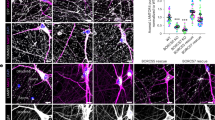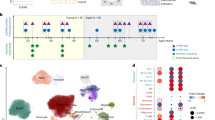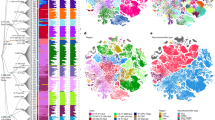Abstract
DURING normal development of the vertebrate nervous system, large numbers of neurons in the central and peripheral nervous system undergo naturally occurring cell death1. For example, about half of all spinal motor neurons die over a period of a few days in developing avian, rat and mouse embryos1. Previous studies have shown that extracts from muscle and brain, secreted factors from glia, as well as several growth factors and neurotrophic agents, including muscle-derived factors, can promote the survival of developing motor neurons in vitro and in vivo2–15. But because neurotrophins and other known trophic agents administered alone or in combination are insufficient to rescue all developing motor neurons from cell death8, other neurotrophic molecules are probably essential for the survival and differentiation of motor neurons. Here we report that glial-cell-line-derived neurotrophic factor (GDNF), a potent neurotrophic factor that enhances survival of mammalian midbrain dopaminergic neurons16,17, rescues developing avian motor neurons from natural programmed cell death in vivo and promotes the survival of enriched populations of cultured motor neurons. Furthermore, treatment with this agent in vivo also prevents the induced death and atrophy of both avian and mouse spinal motor neurons following peripheral axotomy.
This is a preview of subscription content, access via your institution
Access options
Subscribe to this journal
Receive 51 print issues and online access
$199.00 per year
only $3.90 per issue
Buy this article
- Purchase on Springer Link
- Instant access to full article PDF
Prices may be subject to local taxes which are calculated during checkout
Similar content being viewed by others
References
Oppenheim, R. W. A. Rev. Neurosci. 14, 453–491 (1991).
Dohrmann, U., Edgar, D., Sendtner, M. & Thoenen, H. Devl Biol. 118, 209–221 (1986).
Dohrmann, U., Edgar, D. & Thoenen, H. Devl Biol. 124, 145–152 (1987).
Arakawa, Y., Sendtner, M. & Thoenen, H. J. Neurosci. 10, 3507–3515 (1990).
Bloch-Gallego, E. et al. Development 111, 221–232 (1993).
Henderson, C. E. et al. Nature 363, 266–270 (1993).
Oppenheim, R. W., Haverkamp, L. J., Prevette, D., McMannaman, J. L. & Appel, S. H. Science 240, 919–922 (1988).
Oppenheim, R. W. et al. J. Neurobiol. 24, 1065–1079 (1993).
Yin, Q. W., Johnson, J., Prevette, D. & Oppenheim, R. W. J. Neurosci. 14, 7629–7640 (1994).
Oppenheim, R. W., Qin-Wei, Y., Prevette, D. & Yan, Q. Nature 360, 755–757 (1992).
Yan, Q., Elliot, J. & Snider, W. D. Nature 360, 753–755 (1992).
Sendtner, M. et al. Nature 360, 755–759 (1992).
Koliatos, V. E., Clatterbuck, R. E., Winslow, J. W., Cayouette, M. H. & Price, D. L. Neuron 10, 359–367 (1993).
Koliatos, V. E. et al. Proc. natn. Acad. Sci. U.S.A. 91, 3304–3308 (1994).
Johnson, J. & Oppenheim, R. W. Curr. Biol. 4, 662–665 (1994).
Lin, L. F. H., Doherty, D. H., Lile, J. D., Bektesh, S. & Collins, F. Science 260, 1130–1132 (1993).
Stömberg, I. et al. Expl Neurol. 124, 401–412 (1993).
Henderson, C. E. et al. Science 266, 1062–1064 (1994).
von Bartheld, C. et al. Neuron 12, 639–654 (1994).
Riecke, G. K. Physiol. Behav. 28, 755–763 (1982).
Oppenheim, R. W. et al. Devl Biol. 114, 425–436 (1986).
Lance-Jones, C. Dev. Brain Res. 4, 473–479 (1982).
Li, L., Oppenheim, R. W., Lei, M. & Houenou, L. J. J. Neurobiol. 25, 759–766 (1994).
Oppenheim, R. W., Prevette, D., Yin, Q. W., Collins, F. & MacDonald, J. Science 257, 1616–1618 (1991).
Schaar, D. G., Sieber, B. A., Dreyfus, C. F. & Black, I. B. Expl Neurol. 124, 368–371 (1993).
Springer, J. E., Mu, X., Bergmann, L. W. & Trojanowski, J. Q. Expl Neurol. 127, 167–170 (1994).
Yan, Q., Matheson, C. & Lopez, O. T. Nature 373, 341–344 (1995).
Mitsumoto, H. et al. Science 265, 1107–1110 (1994).
Houenou, L. J., Li, L., Lo, A. C., Yan, Q. & Oppenheim, R. W. Progr. Brain Res. 102, 209–219 (1994).
Milligan, C. E., Oppenheim, R. W. & Schwartz, L. M. J. Neurobiol. 25, 1005–1016 (1994).
Author information
Authors and Affiliations
Rights and permissions
About this article
Cite this article
Oppenheim, R., Houenou, L., Johnson, J. et al. Developing motor neurons rescued from programmed and axotomy-induced cell death by GDNF. Nature 373, 344–346 (1995). https://doi.org/10.1038/373344a0
Received:
Accepted:
Issue Date:
DOI: https://doi.org/10.1038/373344a0
This article is cited by
-
Architecture and regulation of a GDNF-GFRα1 synaptic adhesion assembly
Nature Communications (2023)
-
GDNF promotes hair formation and cutaneous wound healing by targeting bulge stem cells
npj Regenerative Medicine (2020)
-
GDNF synthesis, signaling, and retrograde transport in motor neurons
Cell and Tissue Research (2020)
-
A Chemically Defined Common Medium for Culture of C2C12 Skeletal Muscle and Human Induced Pluripotent Stem Cell Derived Spinal Spheroids
Cellular and Molecular Bioengineering (2020)
-
Disruption of calcitonin gene-related peptide signaling accelerates muscle denervation and dampens cytotoxic neuroinflammation in SOD1 mutant mice
Cellular and Molecular Life Sciences (2017)
Comments
By submitting a comment you agree to abide by our Terms and Community Guidelines. If you find something abusive or that does not comply with our terms or guidelines please flag it as inappropriate.



